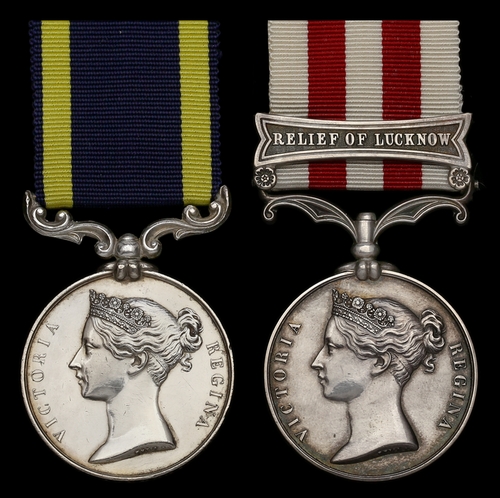
Auction: 25002 - Orders, Decorations and Medals
Lot: 87
The campaign pair awarded to Captain T. E. B. Moubray, 53rd Regiment of Foot, who was seriously wounded by a blast of grape to the face at Kudjwa in 1857
Punjab 1848-49, no clasp (Lieut. T. Moubray, 53rd Foot.); Indian Mutiny 1857-59, 1 clasp, Relief of Lucknow (Captn Thos Moubray, 53rd Regt.), the rank and unit double struck, light contact marks, very fine (2)
Provenance:
Glendining's, March 1981, where the recipient's Punjab medal sold alongside a Crimea medal named to 'George H. Moubray, RN', the recipient's brother, the Indian Mutiny medal has since been located.
Thomas Edward Bowker Moubray was born at Alverstoke, Hampshire on 5 February 1820, the son of Eliza and Captain George Moubray, Royal Navy. Commissioned Ensign with the 3rd West India Regiment on 5 June 1840 he served in the West Indies for the next few years. He was advanced Lieutenant there on 25 February 1842 but returned to Britian in 1844, transferring to the 53rd Regiment that same year.
Posted to India with the Regiment he was stationed in Cawnpore in 1845 and does not appear to have served during the First Anglo-Sikh War. The Soldiers of Shropshire Website lists the officers present for the campaign and Moubray's name is not amongst them, however he was clearly present in India and a fixture of the Regiment. An article in the KSLI Journal of April 1947 notes the donation of the Badges and insignia cut from the sleeve of a Colour-Sergeant mortally wounded at the Sobraon and given to Moubray at the Warrant Officer's own request.
After the war Moubray was certainly involved in the Second Anglo-Sikh War and by 1849 was stationed at Rawalpindi. Advanced Captain on 15 March 1853, he was stationed at Calcutta in 1856 and joined his Regiment upon the outbreak of the Indian Mutiny.
He was present with a column which included a detachment of the 53rd Foot and Peel's Naval Brigade in October 1857. They were escorting a force of siege artillery to Cawnpore when a large force of mutineers were discovered and Lieutenant-Colonel Powell of the 53rd Foot, commanding the column, organised a force to attack them. The two forces clashed at Kudjwa on 1 November with the rebels dug in on an embankment above the main road. The British advanced under heavy fire from the rebel artillery and Colonel Powell was killed, forcing Peel to take command.
The weight of numbers was heavily on the side of the rebels and the battle hung in the balance for a time before Peel, seizing the initiative gathered as many spare troops as he could and worked his way around the embankments, succeeding in diving the enemy force in two. In this way they were driven from the field, this was to prove too late for Moubray however who had already been seriously wounded. He was struck in the face by a blast of grape shot, likely earlier in the Battle when the British were advancing up the road.
He remained in India despite his wounded, however he was certainly earmarked to leave in 1858 as a passage from the Recollections of a winter Campaign in India: in 1857-58 by Captain O. J. Jones, Royal Navy, notes, stating:
'Unfortunately, we lost several men by explosions- one of a magazine in the encampment, and another by the blowing up of a captured tumbril which the 53rd were unlading [SIC]. They had iron shot and powder all mixed together, and something struck a spark, which blew it up, killing and burning fourteen of the regiment.
Almost all those who were badly burned died shortly afterwards. Captain Mowbray [SIC], who had his orders to go to England with invalids, could not resist the temptation of a last fight, when he heard his regiment was going on this expedition, and accompanied it, and very narrowly escaped losing his life by this explosion. He is a gallant Soldier, and distinguished himself at Kudjrah, where Colonel Powel, of the 53rd, was killed, and where Captain Peel, succeeding to the command, gained a brilliant, though hardly won victory.'
Later that same month he was advanced Major on 6 August 1858, however this was the end of his career and Moubray retired in 1860. He did not live much longer either dying on 21 October 1861, given that this was only four years after his wound at Kudjwa we might speculate that he never fully recovered from the injury; sold together with copied research.
Subject to 20% VAT on Buyer’s Premium. For more information please view Terms and Conditions for Buyers.
Sold for
£850
Starting price
£320




